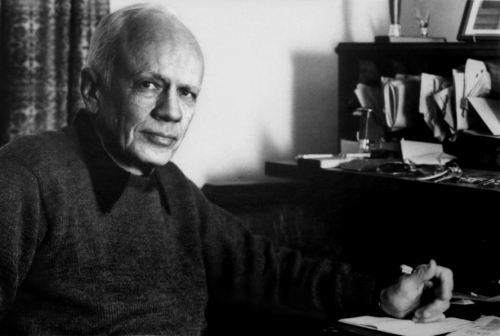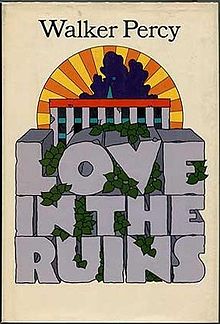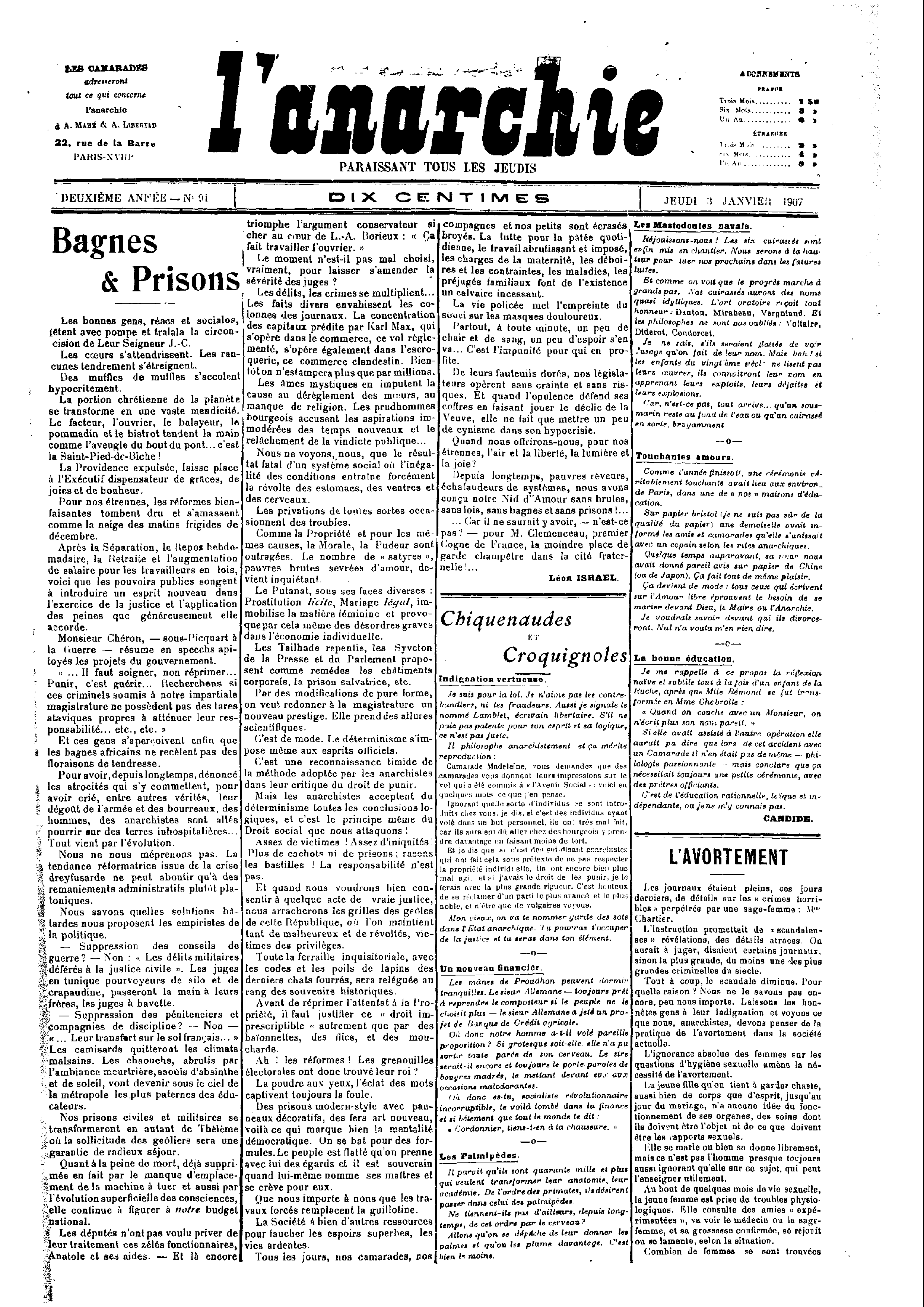A film by Bruce Robbins, Some of My Best Friends Are Zionists, featured here in continuation of b2‘s Legacies of the Future: On the Life and Work of Edward Said.
Author: boundary2
-

A Closing Discussion to 'Legacies of the Future'
Only to put a pin in b2‘s Legacies of the Future: The Life and Work of Edward Said, and the question: what is criticism? And: what is ‘its relationship, among other things, to specifically–but not exclusively–literary form and the function of imagination?’ Here, the scope found in Said.
Trace the entirety of the conference here. (The volume is better with earphones.)
-
Great American Author Series: A Political Companion to Walker Percy
A Political Philosophy of Moviegoing?
by Scott Dill
~While on a flight back to New Orleans, Binx Bolling, the protagonist of Walker Percy’s The Moviegoer, studies a young man who is reading The Charterhouse of Parma. Binx is curious to learn how he sits, “Immediately graceful and not aware of it or mediately graceful and aware of it?” The apparently innocent matter of posture becomes another sign in what Binx calls his “search.” Soon enough Binx concludes in disappointment that his fellow passenger is “mediately graceful” as well as “a romantic.” Because he is reading Stendhal? No, because his mere comportment is so deeply mediated with melancholy self-awareness. “The poor fellow,” Binx reflects, he “has just begun to suffer from it, this miserable trick the romantic plays upon himself: of setting just beyond his reach the very thing he prizes.” His desire will forever pant, but never be fulfilled. To sum up this desperate relationship to desire Binx comments, “He is a moviegoer, though of course he does not go to movies.” Moviegoers have enshrined a popularized form of romantic longing, Percy suggests, centuries after the height of Romanticism. Yet movies offer no innocent frolic among the wildflowers of poesy; for Binx, movies are a capitalist culture’s most exhaustive method of mediating the romantic individual’s desire. One need not even go to movies to be a moviegoer, so pervasive are their effects on the cultural imagination. This diagnosis of the moviegoer’s susceptibility, and subsequent unhappiness, captures Percy’s persistent critique of late twentieth-century American individualism—that its short-circuited self-knowledge cannot sustain a thriving culture.
A new edited collection of essays begins the important work of teasing out the various implications of Percy’s view of the individual for political thought. If the individual is finally unintelligible to himself, what does this imply for the politics of liberal individualism? A Political Companion to Walker Percy, in keeping with the intentions of the Political Companions to Great American Authors series at the University Press of Kentucky, seeks to elucidate Percy’s major contributions to a long, if not august, American tradition of belletristic political writing. For example, the volume’s final essay juxtaposes Percy’s twentieth-century vision of American society alongside of Alexis de Tocqueville’s from the nineteenth. The surprising foil flatters both writers. Yet, even more propitious, A Political Companion to Walker Percy evinces an admirable thematic coherence for a collection of critical essays. Editors Peter Augustine Lawler and Brian A. Smith’s introduction begins with the question: “Why do two political scientists say that an American Catholic novelist can teach us what nobody else can about our nation’s political life?” Though perhaps overstated, it sets the problem each essay shares, even if their topical concerns vary. Lawler and Smith’s answer is that the various ideologies Percy found plaguing our national political life—racism, the reductions of scientism, radical individualism, the ideal of stoicism—are best elucidated by Percy’s unique “indigenous Thomism.” Percy’s “indigenous Thomism” is, according to Lawler and Smith, a neglected but crucial strain of American political thought.
The harmonization of what we know through science and what we know through revelation is the rather distinctively Catholic project called Thomism. There’s a neglected American Catholic tradition composed of Orestes Brownson (author of The American Republic, 1865), John Courtney Murray (We Hold These Truths, 1960), and Percy that holds that a Thomistic interpretation of the greatness of our Founder’s accomplishment is the gift American Catholics can offer their country.
It is the gift of this volume to place Percy in such a tradition. Rather than dealing with Percy exclusively as a Southerner, Lawler and Smith place his thought in a national conversation stretching back to Brownson’s dissenting stand against the rugged individualism of his Transcendentalist contemporaries. This more ambitious, if not more appropriate, placement of Percy’s political thought is due to their view that Thomism offers America “a better foundation for its liberalism than that our nation’s most prominent political philosopher’s have provided us.” A curious claim, but then again, Percy himself loved to provoke.
The argument that Catholic theology provides the key conceptual grounding for a distinctively American liberalism refrains from any legislative prescriptions in these pages. It is rather an argument about what constitutes the best soil for cultivating genuine human flourishing. The editors are quick to point out that Percy does not intend “to politicize the church” and more than he hopes “to have public policy animated by the personal virtue of charity.” His writing does, however, “show how our political life is limited and sustained by who we are as truthful, social, personal, joyful, and loving beings.” Lacking clear political prescriptions, they see Percy’s work as providing a philosophy of personal relations. For the individual is fundamentally social in Percy’s work. An essay by Nathan P. Carson explains Percy’s writing on semiotic theory in light of his convictions about communal virtue. What is often treated as an abstract theory of signification or a rarified problem in the philosophy of language becomes in Percy’s work the grounds for a virtue ethics—semiotics cum communitarianism. Carson concludes that Percy’s “conjunction of the ontological joys of scientific and philosophical inquiry, on the one hand, and radical dependence, other-regard, and community, on the other, is a refreshing and rare combination.” Several of the essays here collected unfold Percy’s conviction that neither language nor the individual can make any sense outside of the communities in which they are formed.
Lawler and Smith’s answer is that the various ideologies Percy found plaguing our national political life—racism, the reductions of scientism, radical individualism, the ideal of stoicism—are best elucidated by Percy’s unique “indigenous Thomism.”
Farrell O’Gorman gets past the isolating idiosyncrasies of Percy’s at times bizarre novels in “Confessing the Horrors of Radical Individualism in Lancelot: Percy, Dostoevsky, Poe.” First, O’Gorman traces the formative influence that reading Dostoevsky’s Notes from Underground had on Percy as he composed Lancelot. Both books “were created by authors who embrace traditional Christianity but utilize obsessive and intentionally offensive post-Christian narrators who simultaneously critique and personify what the authors see as the horrors of the radical individualism engendered by modernity.” If Percy lifted much of the structure of his novel’s critique of individualism from Dostoevsky’s acrimonious narrator, its generic roots stretch down deeper into American soil. In a deft revision of Edgar Allan Poe’s place in gothic fiction, O’Gorman shows how Percy’s time with Allen Tate and Tate’s writing on Poe influenced Percy’s use of gothic tropes, particular its figuration of the female body. O’Gorman argues that the gothic novel emerged from an eighteenth-century moment when a culture “that increasingly valued a self-reliant and essentially disembodied but figuratively masculine rationality sought in effect to exorcise its Catholic past.” He then traces Percy’s reading of Poe to show how the body remains a stubborn stay against the idealized rationality assumed in radical individualism. Rather than celebrate the “American Adam,” the masculine mind free from the gothic past’s figural femininity, Percy represents forms of embodiment that return to and revise the Catholic past so ashamedly disavowed earlier in the gothic tradition.
“Radical individualism,” as here construed, is a threat to the very ideal it commends. Other threats to the liberal individual covered in these essays range from the moviegoer’s “Cartesian theater” to the collective consequences of pursuing happiness to the politics of love and marriage to the reductionist views of scientism. In “Walker Percy’s Alternative to Scientism in The Thanatos Syndrome,” Micah Mattix explicates the relationship between Percy’s semiotics and his view of the novel’s unique cultural work. As opposed to merely descriptive accounts of language, Mattix shows how Percy’s conviction that language is ontologically efficacious—that is, that words are essentially connected to actualities—informs his robust view of the novel. Novels do the moral work of accurately naming the social relations that compose human life. Writing novels, in restoring the moral burden of language, restores the possibility of genuine community.
Percy’s moral commitments are not left alone to collect dust up on the shelf of theory. Brendan P. Purdy and Janice Daurio contribute an essay on the evolution of Percy’s personal views on race relations in the South. “The Second Coming of Walker Percy: From Segregationalist to Integrationist” documents the three strands of Percy’s thought that developed in the forties and informed his 1956 Commonweal article, “Stoicism and the South” (published four years prior to his debut novel, The Moviegoer). To Percy’s treatment of the stoicism he saw represented in the work and life of his famous uncle, William Alexander Percy, they add his reading of Kierkegaard, C.S. Pierce, and his conversion to the Catholic faith. Connecting Percy’s religion with his ethics and his politics, Purdy and Daurio best capture the spirit animating Percy revealed in this volume, “Being a Christian is not a matter of becoming one more political party; it is being formed as a person of a certain sort who brings the vision of who he is to his decision about what he does.” Percy’s Catholicism does not determine allegiance to a political party, but offers a political philosophy of the person that is also necessarily an ethics. To be formed as a person whose identity governs his or her actions is precisely what Percy’s Thomistic vision finds missing in the American polis.
His writing does, however, “show how our political life is limited and sustained by who we are as truthful, social, personal, joyful, and loving beings.”
As unified as these essays are in their exposition of Percy’s thought, a growing silence begins to clamor between the lines of A Political Companion to Walker Percy. While many of its chapters refer to Percy’s view of sacramental mediation, not a single one addresses the kinds of cultural forms that Percy despaired of too thoroughly mediating desire, such as movies or self-help books, and the conventions of the capitalist society in which they thrive. Percy’s indignation that the remnants of an ill-fated Christendom condone the economic structures of solipsistic individualism is largely ignored. This is a shortcoming insofar as it shows the volume’s tendency to pigeonhole Percy as yet another conservative Christian from the South. But Percy’s critique of Christendom is wide-ranging, especially when it comes to what Eugene McCarraher has memorably called “Chrapitalism,” “the lucrative merger of Christianity and capitalism, America’s most enduring covenant theology.” Percy’s work is never without an overwhelming awareness of the crippling effects of baptized consumerism and corporate greed. The flows of capital responsible for enshrining moviegoing as a way of life emerge from real institutions that can and should be fixed. A devout Catholic, Percy was no Chrapitalist.
In his study of contemporary fiction, Partial Faiths: Postsecular Fiction in the Age of Pynchon and Morrison, John McClure traces the surprisingly frequent coalescence of religious and political economies in late twentieth-century American fiction. In what McClure calls the “age of Pynchon and Morrison,” into which Percy lodges squarely, a swath of novels portray new political formations, communities of “preterite spiritualities and neomonastic politics” that put into practice a “politics of engaged retreat.” Of Thomas Pynchon and Don DeLillo’s novels McClure writes, “Scorning the codes of theological order and exclusivity that characterize ‘high’ religious traditions, they develop modes of thought and practice that are scandalously impure.” Both Love in the Ruins and The Second Coming offer images of precisely such an “impure” community, as does the “engaged retreat” modeled on Dostoevsky’s underground man in Lancelot. Percy’s work certainly fits into McClure’s account of a neo-monastic politics. Like Alastair McIntyre’s call for a figure amalgamating Trotsky with St. Benedict, or Michael Hardt and Antonio Negri’s call for a new St. Francis of loving renunciation, Percy’s work longs for a new economic structure of more fulfilling affective resonances. Lawler and Smith’s collection has managed to wrench Percy free from purely regional concerns, but it is too content with the political limitations of red state/blue state quibbles. This book, which contains an essay by Richard M. Reinsch III that argues, “the South’s evangelicalism might […] demonstrate an alternative to the highly secular model blue states present,” suffers from a limited reading of Percy’s political imagination. Percy’s suspicion of the illusions of a left-right dichotomy, served up as the ridiculous feuds of the Knotheads and LEFTPAPASAN in Love in the Ruins, makes such crass correlations dubious, if not scurrilously narrow-minded. As helpful as this collection is in rethinking Percy’s politics, it has yet to come to terms with the vicious bite of this justly lionized Southern Catholic.
__________
Scott Dill is a PhD Candidate in the Department of English at UNC Chapel Hill. He is currently writing his doctoral dissertation on formal representations of the secular in contemporary American novels.
-

Great American Author Series: A Political Companion to Henry Adams
Being Henry Adams
by Barry Maine
~This volume of essays successfully challenges Henry Steele Commager’s assertion in 1937 (reprinted in this volume) that Henry Adams’ “chief significance” is not as a historian or philosopher or teacher or political thinker but as a self-proclaimed symbol of the 20th Century Man educated for the wrong century. It does so by devoting less attention to the author of The Education of Henry Adams than to the other Henry Adams: the editor of the North American Review, the political scientist, the historian, the late convert to the religious scholasticism of Thomas Aquinas, and the secret author of two novels. Nevertheless, The Education of Henry Adams, his most enduring literary achievement, functions as the pole star in this volume or, to mix my metaphors, a Rosetta Stone in reverse, its cryptic pronouncements re-interpreted in the light of Adams’ previous work in a variety of genres.
More than a few authors of these essays point out that Henry Adams’ worries about American democratic government are not that different from our own today. Can a politician beholden to a particular set of interests set those interests aside in the service of the greater, public good? Could such a “statesman” be elected (or re-elected) by popular vote? Have political parties hijacked American democracy? Do our elected officials understand enough about global finance to steer the American economy in rough waters?
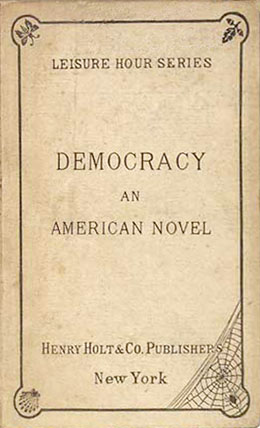 Do advances in technology threaten human control of government? Adams wasn’t optimistic about our solving any of these problems. As editor of The North American Review, Adams could criticize anything and everything that was wrong with American democracy, but he occupied that position in part because he saw that the political landscape of his country had changed so dramatically from the time his famous ancestors served as presidents and statesmen that it would be impossible for him to seek elected office himself. So rather than seek to join in the procession, he became engrossed in the study of it. He wrote biographies of important statesmen, a history of the United States, two novels (Democracy and Esther, published anonymously), a series of scholarly essays on American economics, finance, and politics, a book about the Middle Ages (Mont-Saint-Michel and Chartres), The Education of Henry Adams, mislabeled (and too often misunderstood) as an autobiography, and volumes of letters brilliantly analyzing how a changing world challenged democratic government. Henry Adams on the subject of American democracy is well worth listening to, if we know how to read him.
Do advances in technology threaten human control of government? Adams wasn’t optimistic about our solving any of these problems. As editor of The North American Review, Adams could criticize anything and everything that was wrong with American democracy, but he occupied that position in part because he saw that the political landscape of his country had changed so dramatically from the time his famous ancestors served as presidents and statesmen that it would be impossible for him to seek elected office himself. So rather than seek to join in the procession, he became engrossed in the study of it. He wrote biographies of important statesmen, a history of the United States, two novels (Democracy and Esther, published anonymously), a series of scholarly essays on American economics, finance, and politics, a book about the Middle Ages (Mont-Saint-Michel and Chartres), The Education of Henry Adams, mislabeled (and too often misunderstood) as an autobiography, and volumes of letters brilliantly analyzing how a changing world challenged democratic government. Henry Adams on the subject of American democracy is well worth listening to, if we know how to read him.Other volumes in this series on the political thought of important American authors combine, like this one, new essays with reprinted ones, which is certainly a valid practice given the wealth of scholarship on the subject. But fewer than half of the essays in the Henry Adams volume are new essays. This may say something about the failure of Henry Adams (yet another one!) to attract a new generation of scholars. The best essays in this collection, with few exceptions, were written decades ago, and it may well be that Adams’ best commentators belonged to an earlier generation of scholars not represented here: Ernest Samuels, Earl N. Harbert, Charles Vandersee, William Jordy, and J.C. Levenson, to name a few. On the other hand, this is not a volume of essays written by literary scholars. The contributors come from other disciplines: history, government, and political science. One feels compelled to ask, then, are these Adams’ best readers? Well, clearly some of them are. Michael Colacurcio reads the two novels as covert explorations of pragmatism, Richard Samuelson contributes a historically nuanced reading of Adams’ 1894 Presidential Address to the American Historical Association, and James T. Young brilliantly interprets the evolution of Adams’ complex and evolving political views as they find expression in The Education of Henry Adams.
“Henry Adams on the subject of American democracy is well worth listening to, if we know how to read him.”
There is of course considerable value in bringing together in one place essays, new and old, on such a multifaceted topic, but there isn’t much that is “new” here. (Young’s essay, for example, is reprinted from his own book on Henry Adams, and Colacurcio’s essay is well known enough to be cited by many scholars.) One exception is Denise Dutton’s revisionist reading of Democracy in which she argues that we should not assume that Adams endorses his heroine’s political disillusionment, no matter how much it seems to mirror his own, for that would be reading the novel as autobiography (an all too common practice). Mrs. Madeleine Lee, Dutton argues, is a target of Adams’ satire (for her ambition, misguided sense of privilege, self-indulgence, and self-righteous “moral posturing”) as much as Senator Ratcliffe (for his overt political corruption), and therefore her rejection of American democracy should be regarded as “premature.” Dutton demonstrates that the secondary characters in the novel work together toward a common goal, affirming democracy’s promise, and that the “form” of the novel positions the reader as a participant in the process of negotiating disparate and often opposing views in order to arrive at sound and synthesizing conclusions, models for participation in a democracy for both elected officials and the people who vote for them. Dutton’s is the most radical and most positive reading of Adams’ political thinking in the collection, and the one most acutely attentive to narrative “form,” which Adams once admitted was always his primary interest in everything he wrote.
Any book that shines a light on Henry Adams, one of the most brilliant writers of his or any other generation, is most welcome. The editor of this one, Natalie Fuehrer Taylor, no doubt took on the project with the intention of re-examining the most important aspects and dimensions of Henry Adams’ political thought. Yet that intention is not entirely fulfilled. The volume tends to spin its wheels over the same set of issues (e.g. did Adams believe that history could become a science?) that have been examined before and sometimes to better purpose and effect by J. C. Levenson and company. Other dimensions of Adams’ political thought are missing altogether. There is no essay in this volume that examines Adams’ views on America’s foreign policy, on the uses and abuses of American power abroad, or on his influence upon his close friend John Hay, Secretary of State, in shaping that policy and exercising that power, all of which can be examined in The Letters of Henry Adams. Nor does the volume have much to say about Adams’ views on politically charged domestic issues, such as Westward expansion or Reconstruction in the South. Finally, the approaches to interpreting Adams’ texts are narrower in range than one might have a right to expect. There is nothing wrong, obviously, with “close readings” of the text informed by relevant historical contexts, but one might never know, reading this volume of essays on the political dimensions of literary production, that Fredric Jameson identified something we now recognize as “the political unconscious.” We can look backwards to Hayden White, John Carlos Rowe, and Paul Bové for more theoretically diverse readings of Henry Adams’ political thought, or look forward, hopefully, to a new generation of scholars.
__________
Barry Maine is Professor of English at Wake Forest University. He is the author of “Portraits and Privacy: Henry Adams and John Singer Sargent,” in Henry Adams and the Need to Know (Charlottesville: University of Virginia Press, 2004), 177-205.
To follow all upcoming reviews (most immediately, from the University Press of Kentucky’s Political Companions to Great American Authors) click here.
-
The b2 Review
The print edition of b2 carries only article length reviews. We are starting an initiative to publish shorter reviews and notices of books, new and old, to which we want to draw our readers’ attention.
We will also publish lists of books. We enthusiastically invite our readers to send us short reviews or notices that might be included on this site as part of the community around b2′s research agenda.
update: In upcoming weeks, we will have much more posted here, including our review series on GLBT curated by Petra Dierkes-Thrun.
The b2 Review welcomes recommendations of reviews and reviewers. We decided to develop longer review essays for the copyrighted edition of the journal from the best of the online reviews.
-
Bruce Robbins reports from MLA debate on Israel
Bruce Robbins covers the recent MLA debate and resolution on Israel’s denials of entry of U.S. academics to the West Bank.
Read his full article here.
-
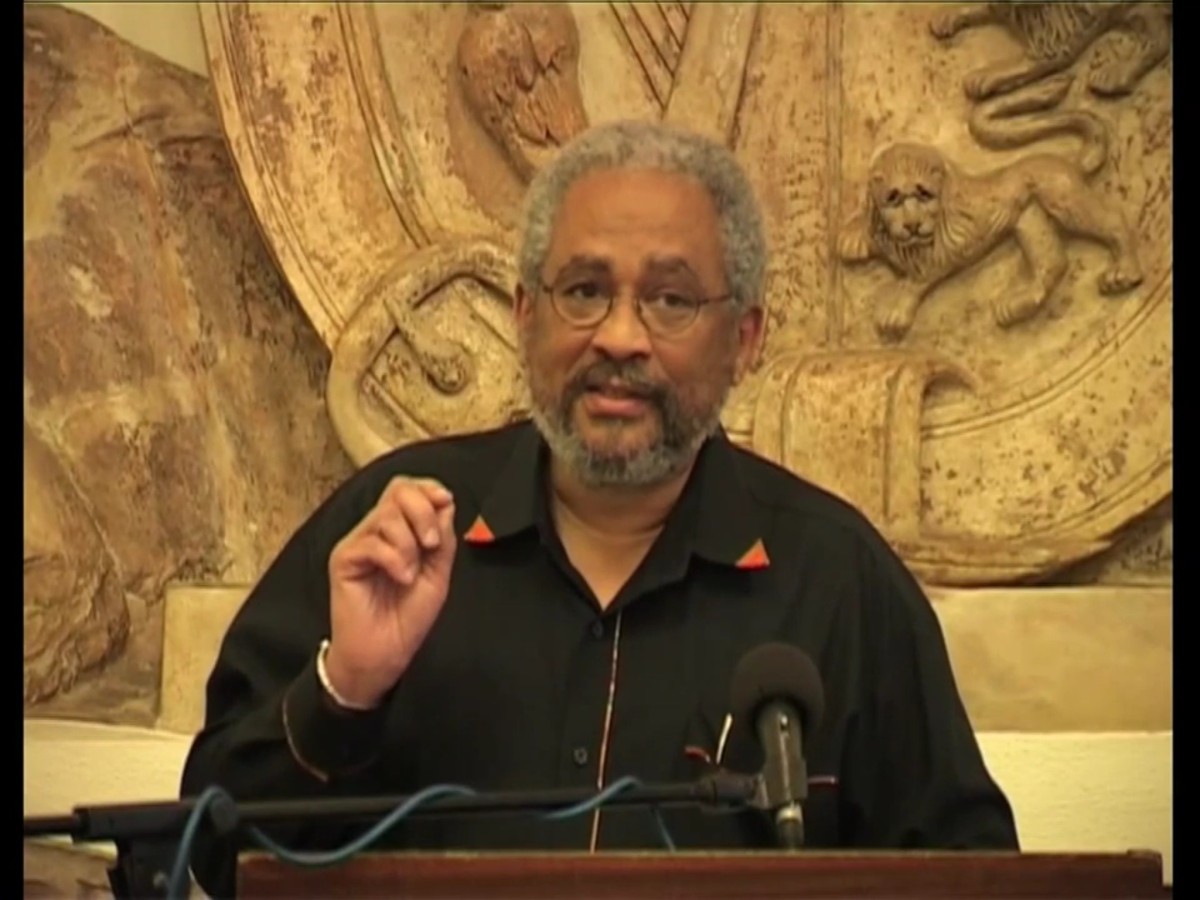
Anthony Bogues, "Practices of Freedom"
Anthony Bogues, at the introduction of the Ships of Bondage exhibit currently held in the Slave Lodge museum in Cape Town, South Africa (and features studies of the Amistad, the Sally, and the Meermin), speaks of slavery and freedom, representation, the sedimentary foundations of slavery, colonialism, colonial modernity and these historical processes that connected the world (41:56). Beginning with reflections on Toni Morrison’s Beloved and André Brink’s Philida, Professor Bogues asks, “How does one represent slavery?” alluding to the attempt “to represent what sometimes we cannot name,” as he wrestles with the idea of freedom as it pertains to the political, the historical and the practice of being human: his thoughts a direct contribution to what he calls “the public curriculum.”
-
The Tunisian revolution three years on
Mohamed-Salah Omri takes stock of Tunisian language, and thus Tunisian cultural production and political sentiment, three years into the revolution: “The revolution in Tunisia was in many important ways a revolution in language.” Read full article here.
__
cover photo: the peaks of Djebel Rassas, southeast Tunis, Tunisia
-

on the ASA Boycott of Israeli Academic Institutions
Colin Dayan (Vanderbilt University) discusses the scope of responsibility institutionalized academia must embrace, and what “academic freedom” means to freedom itself, in light of the American Studies Association’s recent stance on the systematic silencing of Palestinian academia, and the polemics that have followed: “Must the actual separation wall in Israel become a reality in our institutions, blocking our view, disappearing Palestinians and burying the realities of the occupation?”
Read her full opinion piece here.
__
cover photo: A sign on the front door of a Palestinian house which reads: “I have a clear conscience, do you? This home is free of products produced in [Israeli] Settlements.”


